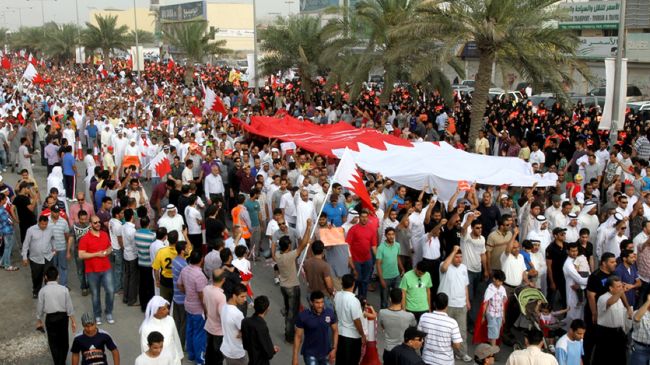(AhlulBayt News Agency) - Although more than 70% of the population of Bahrain are Shia Muslims, their fundamental human rights is disregarded by Bahraini administration. The law of Bahrain deprives Bahraini Shias of living in more than 40% of Bahrain’s territory; for example, the city of Riffa is a forbidden area for them. Whilst the Shias remain generally in the low level of Bahraini social classes, the most important jobs have been allocated to Sunni Muslims. The Shias have no right to be employed in police or army; their children are educated at different low level schools; and they have limited rights, in contrast to their Sunni counterparts, with regard to their bank accounts. The king of Bahrain, all his family and Bahraini elites belong to the minority of Sunni Muslims.
There exist a lot of impediments to the Shia party of Al Wefaq, the most important political force of Bahrain, in this country. Since the beginning of parliamentary elections in Bahrain, the Shia majority gain eccentrically the minority of parliament seats.
Bahraini Shias sought recurrently to modify this discriminatory situation, but the government as well as the King of Bahrain did not take their requests into consideration. Instead of paying attention to the demands of political activists, the government of Bahrain has incarcerated many of them; a large number of them have been tortured and tens of them have been killed.
In 1999, when Hamed bin Isa Al Khalifa became Emir of Bahrain, The Shias, being optimistic, welcomed his reign. From 1999 to 2002, Hamad brought several political reforms to Bahrain. But his attitude has been changed since 2002, when discrimination in housing and jobs, recruiting foreigners to military service, and bringing Sunni tribes from other countries to change the demographic composition of Bahrain have been resumed.
In 2010, although the opposition got 60% of votes, it could gain just 18 out of 40 seats at the parliament. In the same year, 23 political activists have been arrested under the charge of terrorism. In the recent twenty years, tens of thousands of the nationals of Syria, Jordan, Pakistan, and Yemen, who are Sunni Muslims, acquired Bahraini nationality. The government of Bahrain employs the newcomers in police or special organisations completely loyal to Royal family, and many analysists believe that this action is done in order to change the demographic composition of Bahrain and the reduction of the density of Shia population in this country. In addition to gaining Bahraini nationality, newcomers acquire many privileges in comparison to indigenous Shia or even Sunni people. For example, new citizens can use the privilege of public housing swiftly; but as far as the native people are concerned they have to wait even up to twenty years, or even more, to use such a facility. Whilst most of the indigenous Bahraini people are unemployed, the new citizens are employed as soon as they settle in Bahrain.
In addition to the above-mentioned discriminations, violence also can be seen amongst the actions of the government of Bahrain against the Shia majority. The government has spurred “Sunni vigilantes” to attack Shia areas. In April 2012, hundreds of armed vigilantes attacked some Shia villages in response to their opposition to Formula One races. Bahraini security forces did not impede the vigilantes. Although formal governmental proclamations have not referred to the number of victims, eyewitnesses testified that some people were killed and many were injured during the attack.
The US has a good relationship with the court of Bahrain. The US Fifth Fleet shares headquarters with US Naval Forces Central Command in Bahrain. On the other hand, Russia whose deputy of Ministry of State met with the general secretary of Al Wefaq party in 2012, has delivered hope, since then, that all political parties can have a constitutive dialogue with each other. But this request has always met with a negative response on behalf of the government of Bahrain.
It seems that the only way of coming Bahrain out of the crisis is the negotiation between the great world and regional powers, as well as all efficient Bahraini parties. International community has to pay attention to Bahrain.
/106

